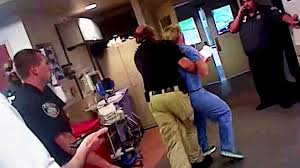 Outrage is the new drug of choice in this country and to a certain extent we’re all addicted to it. Our appetite for outrage has grown so powerful, we often overlook the facts which are sometimes complex and require a thorough examination.
Outrage is the new drug of choice in this country and to a certain extent we’re all addicted to it. Our appetite for outrage has grown so powerful, we often overlook the facts which are sometimes complex and require a thorough examination.
This is what happened in the Utah case involving Alex Wubbels, the Salt Lake City nurse who was arrested July 26 for refusing to let police officers draw blood from an unconscious car crash victim. The recently released video was the vehicle of outrage. In it, we witnessed a female nurse in a tense confrontation with a police officer. The nurse spoke calmly and seemingly convincingly about why she would not allow the blood draw in the hospital. On the other hand, we hear (but never see) the command voice of an officer of the law tell the nurse in no uncertain terms she would be arrested if she didn’t allow the blood draw. The media jumped to the defense of the nurse and portrayed the cop as an over-reaching, power hungry male with a gun and handcuffs. Yet, he was right. Besides being a cop, he is a trained phlebotomist and he did have the right and the duty to take blood from the unconscious patient. Why? Exigent circumstances, that’s why. The patient was involved in a motor vehicle accident involving alcohol. Any delay on the officer’s part would taint the evidence and he had to act quickly.
The nurse said she was following hospital policy. But the hospital’s policy does not have the force of law, even if the local police department agreed to its terms. And crucially, the policy overlooks a well-established exception to the warrant requirement: Police simply do not need a warrant if exigent circumstances justify an urgent search and seizure of evidence. The imminent loss of blood evidence, which would be useful in a drunk-driving case, qualifies as a potentially exigent circumstance.
One writer, a lawyer, noted, “But the coverage of this incident has focused so much on outrage that outlets cannot agree on even this basic factual issue. CNN has reported that the nurse “refused to let police officers draw blood.” The New York Times reported that the nurse was arrested after “refusing to draw patient’s blood.” News outlets cannot even agree on who was going to draw the blood.”
At this early stage in the investigation, the time involving the confrontation in the hospital over the blood draw, the crime scene investigation had just begun and there was no way police could have drawn any substantive conclusions to its cause of possible contributing factors, including the possible actions of the unconscious patient in the hospital.
And yet, the cop is on administrative leave with the Mayor and the police chief preferring to bow to public relations rather than the facts. The cop’s been thrown under the bus before any evidence is in. That just feeds the addictive beast of outrage, keeps the news cycle happy, and cop haters gleeful.
We can all learn some important lessons from this case. YouTube videos don’t always reflect the truth. Sometimes, they give us fire and no light. Secondly, the nurse asserted her right to defy a police officer in the course of his duties as a law enforcement officer. Big mistake. We don’t have unlimited rights in all circumstances. She doesn’t have a right to impede him from doing his duty as a police officer. Finally, know your rights but also know they don’t apply in all circumstances. For instance, if you are questioned by a police officer in a routine traffic stop, you DON’T have the right to refuse to answer. The cop can and most likely will arrest you for it. In a criminal situation, you do have the right to be free from self-incrimination but you can’t use your refusal in all circumstances such as getting out of a speeding ticket. If you’re stopped for speeding or running a stop sign and the officer asks you a question you have to answer the questions. Of course, your answers can’t be used against you if you decide to challenge the ticket later on.
Let’s be smart about our interactions with police. You don’t have a right to impede their duties. Let’s stop the outrage and think for a change. Not all situations warrant our outrage.
